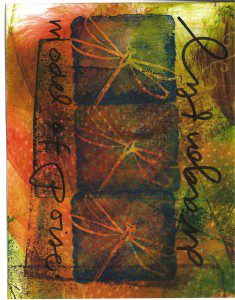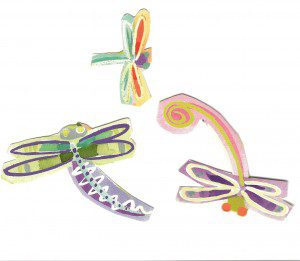 Over the coming few days I’m going to make a case for the dragonfly as a model for modern behavior.
Over the coming few days I’m going to make a case for the dragonfly as a model for modern behavior.
I am utterly taken with all the lessons the dragonfly holds for me and I hope you will find some inspiration in them.
Throughout centuries and across cultures, the dragonfly has been used as a metaphorical model for adaptibility and change. Interestingly enough – the dragonfly itself, over the history that can be cobbled together about it – has changed very little. It is an insect that adapts perfectly to its surroundings and circumstances and has done so over eons. I look at the dragonfly and see pre-history fluttering before my wonder-filled eyes.
I draw the lesson from that for my own life and borrow from American wisdom to articulate it: “If it ain’t broke – don’t fix it.” I’ve had occasion to re-invent myself and my personal operating systems on many occasions. The model of the butterfly reminds me not to change for simply the sake of change. It prompts me to retain the systems that work and reinvent the ones that don’t.
Here’s another magnificent instruction from the dragonfly. Consider first the ordinary housefly. It buzzes around your head and home with seeming zippity speed and ease. To stay aloft that housefly has to flap it’s wings upwards of a thousand times a minute. That’s a lot of flapping, friends.
The dragonfly? With a much larger body span and more weight – flaps its lovely, iridescent wings a mere 30 times in a minute. A picture of efficiency, poise and ease. With the proverbial clock ever ticking on various requirements in the course of a day – it’s tempting to behave like the housefly. Rapid wing movement LOOKS like success and APPEARS very busy. Exhausting is what I say. With 30 flaps a minute the dragonfly models the grace of a master ballerina. The master makes the dance appear effortless and the dragonfly makes it look so easy to stay aloft. And, perhaps, because the insect is operating in accord with its structure and nature, it is easy.
There’s another lesson: when in cadence with our core talents, skills and abilities…things become more natural, full of ease.
I know the butterfly gets lots of attention. This week I’m giving my whole attention to a lesser known icon – the dragonfly.
Happiness is not a station you arrive at, but a manner of traveling. – Margaret Lee Runbeck, 1944 –
Learning too soon our limitations, we never learn our powers. – Mignon McLaughlin, 1963 –
I think learning what you can not do is more important than knowing what you can do. – Lucile Ball, 1954 –
There are some things you learn best in calm, and some in storm. – Willa Cather , 1915 –
People change and forget to tell each other. – Lillian Hellman, 1960 –
The tragedy of life is that people do not change. – Agatha Christie, 1948 –

